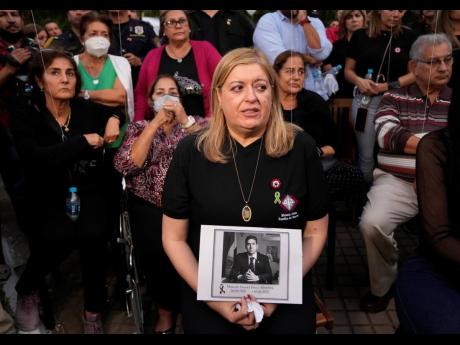Imani Tafari-Ama | Mental health is a human right
May is Mental Health Awareness Month, and citizens are being encouraged to wear lime green on Tuesdays in solidarity with protagonists of preventative methods of promoting a clean bill of health for beleaguered brains. The stressor of mental health underperformance is an indicator of psychosocial dysfunction.
This problem is often difficult to discern, however, because of its stealth and the slippery slope it slithers through the human psyche. While multiple efforts are devoted to raising public awareness about mental health and its converse, mental ill health, it is also a difficult problem to tackle. This elusiveness persists because of the stigma attached to any indicator of compromised mind capabilities. This discomfort is not the same with physical ailments. Somehow, the mindscape malfunctions cause people to be afraid to disclose the problems they may be experiencing in this domain.
The mass-shooting attack in Buffalo recently, which left 10 African Americans dead, was a deliberate act of racist terror. Yet the perpetrator, 18-year-old Payton Gendron of Conklin, New York, is claiming self-defence, by reason of insanity, as the legal response. Should this act be included in the category of a mental health deficit? Surely, this intentional enactment of a hate crime cannot be categorised in the same slot as someone who is suffering from the “natural” impact of stress or broken brain synapses. However, Gendron, whose obsession with murder-suicide, was played out in his presentation of a school project on the subject a year earlier, should not benefit from the bly of being categorised as insane as a ploy to get away with murder. On the other hand, he does make a good point. Perhaps we should define racism as a mental-health infraction.
Eurocentric categorisation of indigenous people - Africans, Indians, Chinese among other so-called “races” - as inferior to Europeans provided the basis for the building of a global capitalist system. The success of this sleight-of-hand is sheer madness.
RACIST RELATIONS OF LABOUR
Enslavement enriched Europe and was dependent on racist relations of labour and power that served to dehumanise Africans. This enduring system of colonialism must, surely, qualify for the definition of insanity. What is deemed normal, therefore, must be seen as an existential aberration. European leaders resist paying reparations with the disclaimer that “it was legal” back in the day. Aha! That did not make it right. Or sane. Racism is dependent on a flawed perception of the world and the peoples in it. The reproduction of such dissonance is also tantamount to madness.
The explanation that Gendron is insane is not so far-fetched because white supremacy results from and in aberrant thinking and behaviour. The notion of replacement, the fear-based narrative constructed to justify categorising migrants as undeserving of their place in the community, also subscribes to the defacing of history and replacing it with a lie. Otherwise, how does the “discovery” of North America in 1620 come to take precedence over the reality that for centuries, Native Americans regarded the so-called empty spaces as home? Thanksgiving thus fails to acknowledge the migratory history of Europeans and the violent usurpation of the indigenous peoples they replaced. Such myopia inevitably results in many-sided forms of social insanity, manifested as prejudice, stereotyping, decimation, and racialised.
One cannot always trace the factors that act as chemical and psycho-social barriers to well-being. In a social sense, though, mental health anomalies may relate to the normalisation of inappropriate perceptions. Such faulty responses characterised the recent murder of 62-year-old Chieftin Campbell, the man mistaken for a thief, who was set upon by an angry mob in Mandeville on May 6. The jury is still out about whether the real culprits accused Mr Campbell to create a decoy and cover up their own criminal tracks. Speculation aside, some participants in the “jungle justice” mob may have to face the music of murder charges. Footage from security cameras have revealed the identities of some of the culprits of this collective crime.
DOUBLE JEOPARDY
It is true that the snail’s pace at which the justice system crawls is incentive for citizens to literally take the law into their own hands. As the final report by the Jamaican Justice Reform Task Force, led by the late Prof Barry Chevannes revealed, there is a political economy of justice in Jamaica that favours those with the means to navigate the expensive system of legal accountability. This class-specific bulwark may be classified as the embodiment of official madness, which marginalises the majority class from access to a fair hearing. However, mob killings need to be unpacked to examine the callousness of this herd response that cares naught about snuffing out a human life to compensate for the hurt suffered at the hands of the offender. In this instance, the bloodthirsty response was not the result of a threat to any of the perpetrators. They just got wind of the rumoured wrongdoing and joined in the fray. As it turned out, they killed the wrong man. Madness, right?
The double jeopardy of this faux pas was that the victim had just left his fiancée, (who remained unnamed in the accounts I read), at the nail technician. She was dolling up herself ahead of their wedding planned for May 12. What kind of madness has this trauma unleashed in the mind and daily life of the hijacked bride? How is she expected to cope with the aftermath of this assault on her anticipated happiness? In our historical experience, mob killings could be classified as defiant of all vestiges of reason. What kind of artist and publisher would (and did) make postcards of a lynching and share them with family and friends? What kind of person would receive such a missive without protest? What kind of soul would have thought that it was okay to collect the memorabilia (including body parts like sex organs) from a lynching event?
The enactment of such atrocities is testament to a form of thinking that rationalises the denial of the human rights - of Africans vis-à-vis Europeans - in the context of colonialism. When social dysfunction is normalised as culture, then we glibly overlook the obvious madness of denying every citizen their inalienable human rights. Charles Mills talks about this at length in The Racial Contract. The compounded tragedy of internalised racism is the super mental health problematic. That is why Marcus Garvey urged and Bob Marley sang, “emancipate yourselves from mental slavery…”
Finally, I considered the fate of prominent Paraguayan Prosecutor Marcelo Pecci, who was murdered recently while honeymooning on a beach in Columbia. His wife, journalist Claudia Aguilera, had recently posted a photograph on Instagram, announcing that she was pregnant. By so doing, she inadvertently revealed their location. Gunmen arrived in a boat or on jet skis (she was too confused to recall which) and executed the judge with two gunshots. This reveals the porousness of social media and the madness of believing that there is a safety net surrounding posts made on public communication platforms. Beyond the psychoses that motivate murderers, more crucial to consider is the mental health of the survivors of such a brutal act and the possible trauma that her unborn child is already in line to suffer simply because she was in the wrong place at the wrong time.
Even if it seems like a waste of time, grief counselling is strongly recommended for us all in Jamaica, land we love, where even to watch the nightly news we must have a trigger warning to safeguard the mental health of children. Of course, it would be more sensible for the society not to have to produce the news content in the first place.
- Dr Imani Tafari-Ama is a research fellow at The Institute for Gender and Development Studies, Regional Coordinating Office (IGDS-RCO), at The University of the West Indies. Send feedback toimani.tafariama@uwimona.edu.jm.


